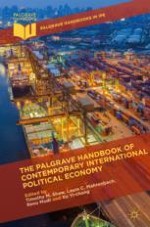2019 | OriginalPaper | Chapter
33. Natural Resources
Author : Jewellord Nem Singh
Published in: The Palgrave Handbook of Contemporary International Political Economy
Publisher: Palgrave Macmillan UK
Activate our intelligent search to find suitable subject content or patents.
Select sections of text to find matching patents with Artificial Intelligence. powered by
Select sections of text to find additional relevant content using AI-assisted search. powered by
